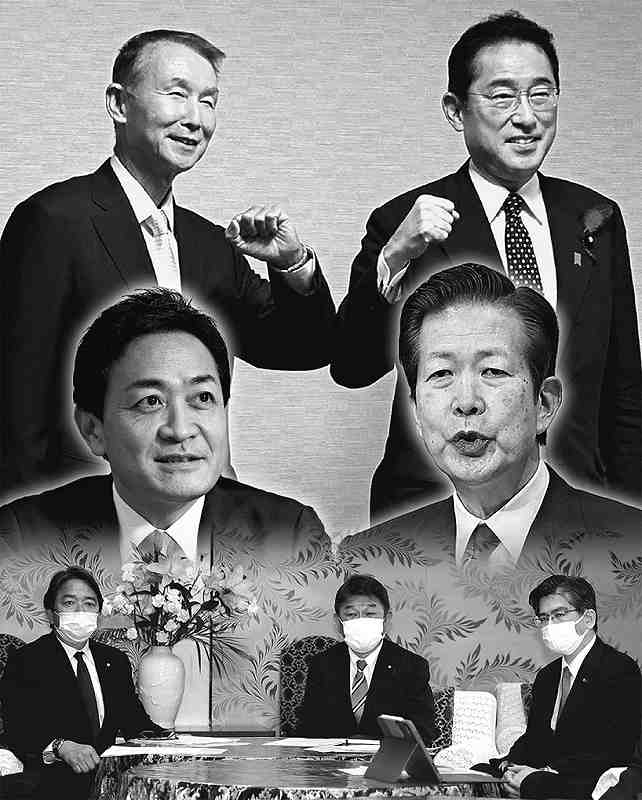POLITICS | Kishida’s first-year report card / PM’s approach to party politics strains ‘honeymoon’ with Komeito

Clockwise from top left: Shuhei Kishimoto, a former member of the Democratic Party for the People who plans to run in the upcoming Wakayama gubernatorial election; Prime Minister Fumio Kishida; Komeito leader Natsuo Yamaguchi; Komeito Secretary General Keiichi Ishii, Liberal Democratic Party Secretary General Toshimitsu Motegi; DPP Secretary General Kazuya Shimba; DPP leader Yuichiro Tamaki
20:00 JST, October 12, 2022
Prime Minister Fumio Kishida’s Cabinet has passed the first anniversary of its inauguration with its approval rating on the decline. This series examines how Kishida’s political style so far has affected the handling of key issues and what the future holds for his administration.
***
“Considering the entire political situation and the handling of the Diet sessions in the future, this is not a bad option.”
On Sept. 16, Liberal Democratic Party Secretary General Toshimitsu Motegi asked Prime Minister Fumio Kishida, who is also the president of the LDP, for his decision about the upcoming Wakayama gubernatorial election. The “option” Motegi was referring to was endorsing Shuhei Kishimoto, a former member of the House of Representatives who is running for governor after leaving the Democratic Party for the People, instead of fielding an official LDP candidate.
LDP headquarters had received a proposal from the party’s Wakayama prefectural chapter to endorse Kishimoto because it was struggling to field an official candidate on its own, due to a conflict within the chapter.
Although Kishimoto is now an independent, he still has the full support of the DPP. Thus, the LDP’s Wakayama chapter is not in unanimous agreement on whether to support him. However, Kishida approved the endorsement, saying: “Please proceed toward endorsing him. I want you to discuss this with the DPP.”
Motegi immediately called Yuichiro Tamaki, the leader of the DPP, with whom he had been in contact for some time, to inform him of Kishida’s decision. The LDP decided to endorse him on Oct. 3.
On the following day, Kishida handed over a certificate of endorsement to Kishimoto at LDP headquarters, and they were photographed together smiling and touching elbows. Voting in the gubernatorial election is to take place Nov. 27.
During the last ordinary Diet session, the DPP voted in favor of the government’s initial and supplementary budget proposals for the current fiscal year. In an unusual move for an opposition party, a framework was also established for policy discussions among the LDP, Komeito, and the DPP.
The DPP and the LDP had identified mutual interests, as the DPP hopes to increase its influence in the Diet by implementing policies and the LDP wants to strengthen its political power base by dividing the opposition, eyeing the DPP as a possible future non-cabinet ally.
Order
The approval rating for the Kishida Cabinet declined after the House of Councillors election, and some members of DPP have expressed concern, saying that if the party is too close to the Cabinet, it might be dragged down with it.
The LDP intends to use the cooperation in the Wakayama gubernatorial election as a stepping stone to maintain good relations with the DPP. The DPP’s presence is becoming increasingly important, as the Nippon Ishin no Kai (Japan Innovation Party) has begun to distance itself from the LDP, compared to past cabinets led by Shinzo Abe and Yoshihide Suga.
The ruling party will do its utmost to pass the second supplementary budget at the extraordinary Diet session. On Sept. 13, the DPP proposed an emergency economic stimulus policy package that includes cutting electricity prices. The LDP leadership has begun examining the feasible items in the DPP proposals to incorporate them into the budget, in the hope the DPP will vote in favor as it did the last Diet session.
While the LDP is getting closer to the DPP, there is notable strain in its relationship with Komeito, which has lasted since the coalition government was formed in 1999.
“I think it’s unnecessary for the government to give cash benefits to the public, repeating similar measures in the past. What do you think?”
On Sept. 2, Komeito leader Natsuo Yamaguchi visited Kishida at the Prime Minister’s Office and conveyed the party’s position on measures to counter high prices. Yamaguchi’s concern was that the cash benefits may cause dissatisfaction among people who are not eligible.
Despite Yamaguchi’s candid advice, the government decided a week later to include a ¥50,000 payment to low-income households in its price hike countermeasures. Yamaguchi’s fears turned out to be justified, as Komeito lawmakers received a string of complaints from party supporters.
There was no explanation from the government prior to the decision, and Yamaguchi openly complained on a TV program that day, “I want them to be a little more considerate.”
True intentions
Komeito policy leader Yosuke Takagi, who was appointed the post to in September, has a wide range of contacts among Motegi and other senior officials of the LDP, and his counterpart, Koichi Hagiuda, the chairperson of the LDP’s Policy Research Council. Takagi and Hagiuda are both from the same electoral constituency of the Tama region in Tokyo. They have been friends for 30 years, since the days when Takagi was a reporter for a national newspaper and before Hagiuda entered politics.
There are signs of improvement in the relationship between LDP and Komeito, as the two men privately agreed to begin security policy talks as soon as possible after their first meeting of ruling party policy chiefs on Oct. 4.
However, the depth of the relationship between the two parties is different compared with how it was under previous cabinets. Yoshihide Suga, who served as chief cabinet secretary under Abe and later became prime minister himself, maintained close ties with the inner circle of Soka Gakkai, the lay Buddhist organization that backs Komeito, and shared the common policy direction of the entire administration.
A senior Soka Gakkai official complained about Kishida that “it’s impossible to understand what he is really trying to do.”
Although Komeito ostensibly welcomes the framework of the three parties — the LDP, Komeito and the DPP — a sense of caution persists within Komeito that security policy and constitutional revisions will be forced through by the LDP and the DPP.
The honeymoon between the LDP and Komeito has the potential to change depending on how the three parties interact with each other.





